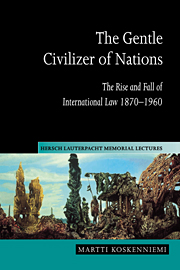Book contents
- Frontmatter
- Contents
- Preface
- List of abbreviations
- Introduction
- 1 “The legal conscience of the civilized world”
- 2 Sovereignty: a gift of civilization: international lawyers and imperialism, 1870–1914
- 3 International law as philosophy: Germany 1871–1933
- 4 International law as sociology: French “solidarism” 1871–1950
- 5 Lauterpacht: the Victorian tradition in international law
- 6 Out of Europe: Carl Schmitt, Hans Morgenthau, and the turn to “international relations”
- Epilogue
- Bibliography
- Index
2 - Sovereignty: a gift of civilization: international lawyers and imperialism, 1870–1914
Published online by Cambridge University Press: 06 July 2009
- Frontmatter
- Contents
- Preface
- List of abbreviations
- Introduction
- 1 “The legal conscience of the civilized world”
- 2 Sovereignty: a gift of civilization: international lawyers and imperialism, 1870–1914
- 3 International law as philosophy: Germany 1871–1933
- 4 International law as sociology: French “solidarism” 1871–1950
- 5 Lauterpacht: the Victorian tradition in international law
- 6 Out of Europe: Carl Schmitt, Hans Morgenthau, and the turn to “international relations”
- Epilogue
- Bibliography
- Index
Summary
Surveying the state of international law at the turn of the century, Enrico Catellani (1856–1945), Professor at the University of Padua and member of the Institut de droit international gave a gloomy view of the situation. If there was one tendency, he wrote, that was evident from the first moments of the new century, it was the increasing use of force in the determination of the fate of peoples. The law was moving away from the mid-nineteenth-century ideals of justice and equality. No doubt, there had been many developments in a positive direction: the increase and technical improvement of treaty law and private international law, progress in arbitration and the emergence of functional international cooperation. These developments were, however, overweighed by negative ones. No real international society had come to existence beyond Europe and the fundamental rights of peoples or States were no better protected than a century before. Europeans still acted from a position of superiority towards others: capitulation regimes, consular jurisdiction, and brutal colonial wars had become banal aspects of the international everyday. Advancing civilization oppressed and impoverished indigenous populations to the point of extinction – a fact accepted by imperial powers as an inevitable consequence of modernity. Even in Europe, powerful States had set up a permanent reign of control over the continent so that smaller powers enjoyed less autonomy than ever. All in all, Catellani exclaimed, the nineteenth century had closed with imperial domination, methodological enslavement of populations, and war.
- Type
- Chapter
- Information
- The Gentle Civilizer of NationsThe Rise and Fall of International Law 1870–1960, pp. 98 - 178Publisher: Cambridge University PressPrint publication year: 2001
- 1
- Cited by

